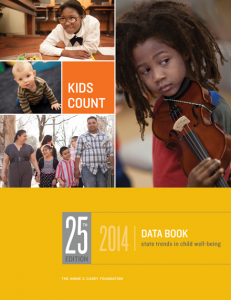RI KIDS COUNT Policy Change
 •
•
In Rhode Island, elected officials and community leaders use both the national Kids Count Data Book, so they can see how RI compares to the other states and the nation as a whole, and the annual Rhode Island Kids Count Factbook, to see how Rhode Island is doing state-wide and throughout its 39 cities and towns.
This information helps to propel action in areas where Rhode Island doesn’t compare well to the nation or to the other New England states. For example, this year, Massachusetts ranked number one while RI ranked 26th. We have a competitive spirit and want to lead the way in the nation and in New England. The Data Book gives us a road map on how to get there, and shows us how far we need to go.
The data can sometimes ring an alarm bell that results in policy change. When we first published data on the high percentage of children entering kindergarten with a history of lead poisoning, it helped ignite a major community prevention and treatment effort and helped spur a new lead poisoning law. And when we highlighted the issue of out of school suspensions due to absence, school superintendents and school committees began changing their suspension policies which led to a new state law that prohibits the use of out-of-school suspensions for reasons of attendance.
Kids Count data lets us know how we are doing when it comes to the health, education, economic well-being and family circumstances of our children — and how our state compares on these critical measures. But this data does more than simply inform. It provides a much-needed rallying cry and road map for action so that communities can take concrete steps to improve outcomes for children and our society.








